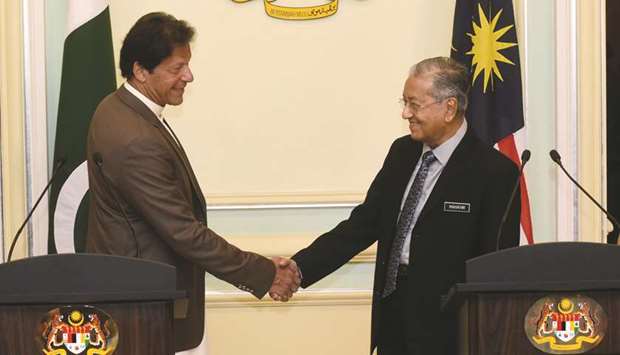Japanese philosopher, educator, author, and nuclear disarmament advocate Daisaku Ikeda says something very profound about the need for communication in international relations that has withstood the test of time.
Avers the 92-year-old, “Whether in our local communities or in international relations, the skilful use of our communicative capacities to negotiate and resolve differences is the first evidence of human wisdom.”
In this very space a fortnight ago, one had reasoned that Pakistan’s decision to pull out of the Kuala Lumpur Summit last December, where Prime Minister Imran Khan was one of the top three leaders hogging the pre-summit limelight and slated to be the opening keynote speaker, was forced by circumstance but still likely in the best interests of the Islamic world.
Predictably, the late withdrawal raised eyebrows and armchair critics were quick to see it as a form of an imposed decision coming from the lopsided prism of a one-state relationship. However unfortunate it seemed, the fact is Islamabad did calibrate it within the context of its foreign policy imperatives with caution being the rider.
To his credit, even if barely concealed disappointment, the Pakistani prime minister admitted as much as he first called up his Malaysian counterpart Mahathir Mohamad to explain the decision back in December and then made a bold decision to visit the veteran leader in Kuala Lumpur on Monday.
The general perception was that Khan’s two-day official visit was primed to placate Kuala Lumpur, but that is once again, a restricted view from which to gauge the relationship. For starters, Mahathir had not only understood the context and situation back then but also graciously, accepted Islamabad’s decision. He showed the same warmth and courtesy he had extended to the Pakistani leader on his first visit to Malaysia in 2018 upon assuming office.
True to form, Prime Minister Khan — who is not a great fan of semantics anyway — was extremely forthcoming in acknowledging that fears advanced by a few members of the Organisation of Islamic Conference about the Kuala Lumpur Summit being a ruse to divide the Islamic unity and replace it — and which Pakistan factored in its decision to skip the summit — were unfounded.
“Unfortunately, our friends, who are very close to Pakistan as well, felt that somehow the conference was going to divide the Ummah (Islamic world). It was clearly, a misconception because that was not the purpose of the conference as evident from when the conference took place. I want to say how sad I was that I couldn’t attend the conference in Kuala Lumpur,” the PM admitted.
It is possible that a similar decision with comparable stakes such as the one the Kuala Lumpur summit raised would have ruptured a relationship with accompanying consequences elsewhere, but there is more at play here than mere semantics of bilaterals. And it is to do with the deep personal chemistry that Khan and Mahathir enjoy.
Imran Khan remains a global celebrity for his exploits as a former World Cup-winning cricket captain, one of the game’s greatest all-rounders as well as a renowned philanthropist who founded a world class state-of-the-art cancer hospital and a university for students with humble origins before he shot to power in 2018 after a 22-year political struggle, but he also is a self-proclaimed admirer of Mahathir Mohamed.
As an opposition leader, he would often recount Mahathir’s sterling leadership in turning around Malaysia’s fate — going back to 2006, when he invited the Malaysian prime minister to a conference in Islamabad entitled “A Clash of Civilizations or A Clash of Interest?”
Mahathir surprised many in accepting the invitation and later visiting Khan’s residence even though back then, he was still trying to find his feet in the rough and tumble of Pakistani politics.
In the intervening years, Khan would regularly invoke Mahathir’s leadership, which helped turn a largely rubber-dependent country divided along ethnic lines into a well-oiled machine and high-tech Asian tiger, with self-belief and single-minded dedication.
In 2012, in an interview with the British broadsheet The Guardian, Khan named him alongside the-then Turkish prime minister and current president Recep Tayyip Erdogan; former Brazilian president Lula Da Silva; and the-then Singaporean prime minister Lee Kuan Yew as leaders he admired most.
Khan and Mahathir struck an immediate rapport once the latter surprised the pundits in winning back power in Malaysia after coming out of retirement at the age of 92 in May 2018. Two months later, the former, at 66, also won power in Pakistan, for the first time.
In the last 15 months, the Pakistani PM has visited Malaysia twice and his counterpart was the chief guest at Pakistan’s National Day parade in March last year. The two also met on the sidelines of the UNGA session in New York the same year, where they, along with Erdogan, agreed to launch a united front to fight Islamophobia and work collectively to promote a holistic understanding of Islam globally with electronic media as the pivot.
In Kuala Lumpur, the two sides signed on three agreements with Islamabad also pledging to buy more palm oil to compensate for the restrictions placed on its bilateral trade by New Delhi following Malaysia’s stand over Kashmir. The presence of Foreign Minister Shah Mehmood Qureshi; Federal Minister for Planning, Development and Special Initiatives Asad Umar; and Adviser to the PM on Commerce, Textile, Industry and Production Abdul Razzak Dawood underlined the significance attached to the visit.
To show that he means business, and to underline Islamabad’s sovereign and independent course, Prime Minister Khan promised to attend the Kuala Lumpur Summit the next year. “Of course, I would because now, it is evident that the Kuala Lumpur Summit was not to divide the Ummah. If anything, it was to unite the Ummah, so of course, I would love to come.”
Next, Turkish President Erdogan is also due in Pakistan this month, which lays to rest the rumour mill in the wake of Islamabad’s Kuala Lumpur ‘no-show’ that it would drive a wedge in the trilateral relationship. Far from it, Islamabad has reasons to look up with the testy winter soon giving way to a spring of hope.
The writer is Features Editor. He tweets @kaamyabi

WARM AS EVER: Pakistani Prime Minister Imran Khan shakes hands with Malaysian Prime Minister Mahathir Mohamad in Putrajaya, south of Kuala Lumpur, on Tuesday. AFP

